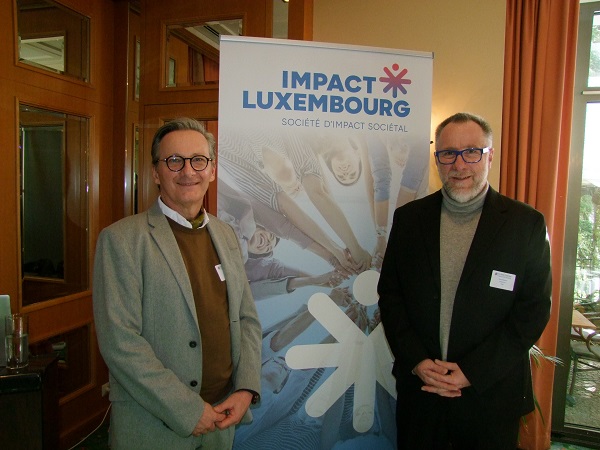 (L-R): Daniel Tesch, ULESS; Daniel Eischen, BCC;
Credit: Chronicle.lu
(L-R): Daniel Tesch, ULESS; Daniel Eischen, BCC;
Credit: Chronicle.lu
On Tuesday 21 February 2023, the British Chamber of Commerce (BCC) in Luxembourg held a luncheon event at the Hotel Parc Belair in Luxembourg-Merl on the topic "Social enterprise and the IMPACT LUXEMBOURG Label".
Before the meal, Daniel Eischen, BCC Chairman, welcomed the 35 attendees and briefly reflected on the traditional format of business lunches which has somewhat been forgotten; the last one (pre-pandemic) was at the same venue with Luxembourg's then-new Minister of Health, Paulette Lenert, in February 2020. He said that it was nice to be meeting in small, intimate groups. He asked why do we do what we do, and do our aims go beyond commercial gains, explaining that the topic of social impact will be addressed by the guest speaker today, including how impact can be measured.
In 2016, Luxembourg took a decisive step in order to support and accelerate the emerging Social and Solidarity Economy. With the creation of a specific and dedicated legal status, the government paved the way for the creation of Social Impact Companies (SIS - Sociétés d'Impact Sociétal) allowing Social Entrepreneurs to engage in a new mode of multi-stakeholder value creation.
The IMPACT LUXEMBOURG label was launched at the end of 2022 by the Ministry of Labour, Employment and the Social and Solidarity Economy in collaboration with the business federation ULESS as a Label that gives social entrepreneurs the possibility to increase their visibility and attractiveness in the market.
Guest speaker Daniel Tesch, Director at ULESS, presented the market opportunities of the SIS status, using his presentation entitled "Between Consumption and Impact" for illustration. He explained that there is so much to be said on the topic...
He explained that he is not politically engaged (despite being on a DP list a number of years ago); he mentioned that Minister Lenert has been one of the main actors aiding social impact become reality. He talked about how, institutionally, we can contribute to the social economy. He described social economy starting in churches and has evolved into philanthropy, institutional caritative support and private involvement.
Nowadays, Luxembourg has around 15,000 jobs in the social economy which is around 4% of the workforce and represents 0.8% of national GDP (compared to 19.1 million jobs / 10% of GDP at the EU level). Previously, the social economy was not really understood and could therefore not be measured. He explained that it started following the 2008 financial crisis (ULESS was created in 2013 at COP13, with the Declaration of Luxembourg following COP21 in 2015 held in Paris (involving six countries).
The SIS law (Sociétés d'Impact Sociétal) came about in 2016 which he described as a landmark in the social impact evolution. It defined the social economy as relating human and environmental concerns, i.e. sustainable development. He also referred to the European Action Plan (2022) for the Social Economy... to support the Proximity, Social Economy and Civil Security ecosystem.
He talked about turning constraints into actions and the release of the IMPACT LUXEMBOURG brand launched in 2022, with SIS companies (three options: SA, Sàrl, Coop) offering 0% income tax on "impact shares" and which can emit deductible donation certificates. Such SIS companies do have certain restrictions, including a limit on six employees on minimum salary.
He revealed that the current portfolio of SIS companies spans a number of business sectors, including consulting, marketing, IT, commerce/trade, training & education and agriculture.
He also talked about shifting business models from traditional, via transitional to Next-Gen models which are full-profit and have maximum impact.
He concluded by stating that the next step involves informing and convincing consumers, revealing that service-based economies are more open and more positive to the evolution.








